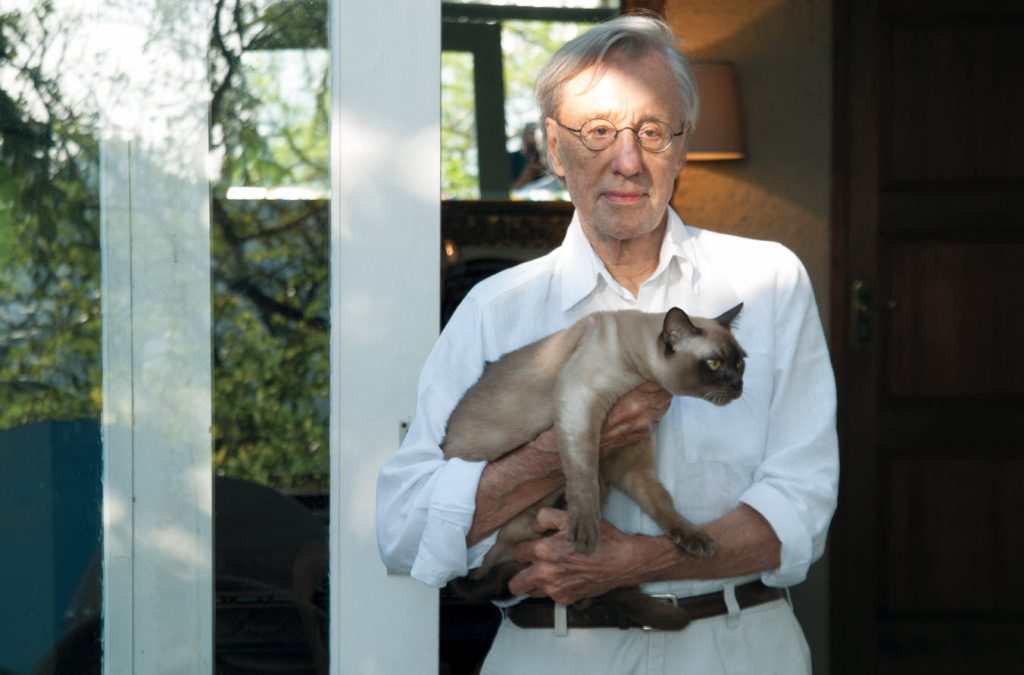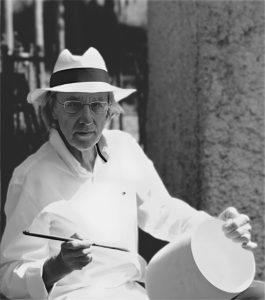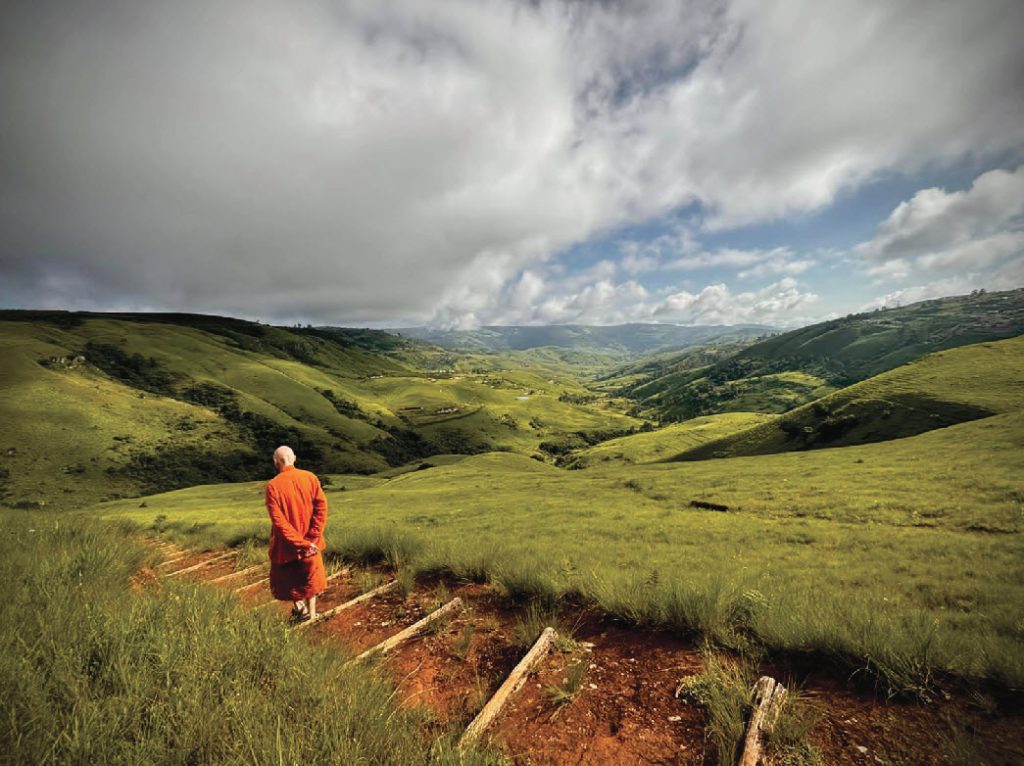What does ‘to retreat’ mean? The 13th century Zen master Dogen advises: “Take the backward step and turn the light inward.” It’s a good description of the retreat experience, particularly one with a focus on meditation. By Debra Robins
CNN featured the BRC as one of the 10 finest meditation centres in the world.
Meditation benefits every aspect of our being – body, mind and soul. We spend most of our lives looking for happiness, peace and fulfilment outside ourselves. During meditation we begin to explore and expand awareness, the essence of who we really are, restoring the memory of wholeness in our lives. It is a process to rediscover the quietness that is already there, that has always been there – this silence is the thought between thoughts, the silence of pure awareness.
My first retreat was undertaken in silence at the Buddhist Retreat Centre in Ixopo, KZN. That was 1986. I was the breadwinner, with an almost three-year-old toddler and a 15-month old baby and had found myself in a fast-paced job and a JSE listing, way above my business savvy and life experience.
The escape from the cacophony of my life and external distractions and embracing solitude and silence for the first time in my life… I thought I would lose my mind! As the fears and the rollercoaster of emotion started to dissipate… I began to connect with my thoughts and emotions on a deeper level, gently gaining equilibrium. This coupled with a ‘Work-Life Balance’ retreat a few months later was the beginning of an entire new way of being.
Twenty years later I experienced ‘Silent Awakenings’ in Monterey California, with Deepak Chopra and David Simon. This retreat moved me from the pursuit of ‘mindfulness’ to deep mindful experience that felt more like a hyperawareness of everything within and around me as I witnessed the ‘going within’ occur in a fraction of a second.
A silent retreat is an intense, life-changing experience. From a personal perspective I have received lasting transformation in my life, the most impactful, not being as caught up in my thoughts and feelings as I move throughout my day. Calm has become my ‘super power’.
The BRC has been my go-to space over almost 40 years…
Over the years I have hosted retreats at the BRC, one that springs to mind is ‘Touch your Soul.’ I have attended the most powerful retreats with some of the most incredible teachers, not always meditation.
I have embraced the silence, the beautiful energy, the gardens, the birds and all of the gifts from Gaia at times when I needed them the most. It has been a space to complete books and other works for publishing. An inspiration when faced with difficult decisions and my space of choice to feed my soul. One of the most memorable retreats I attended was a birding retreat, to experience the Blue Swallows of the BRC with Aldo Berruti.
Aldo began birding in his youth; this evolved into a career as a research ornithologist, attaining a MSc and PhD. After 2O years, including work on albatrosses at Marion Island, water birds at Lake St Lucia and seabirds of the Western Cape, Aldo changed to conservation, becoming the first Director of BirdLife South Africa from 1996 until 2004. He shares his experience of the BRC.
“The Buddhist Retreat Centre at Ixopo is a special place. Of course, most people associate the BRC as a font of Buddhist teachings and practice. For myself, the BRC played a watershed role in my life some 35 years ago at a time of personal introspection. My involvement there included running a birding retreat, which led to a chance reconnection with a wonderful woman from university days, leading to marriage and a lifelong partnership.
Birds have been a pillar of my existence from innocent pre-teen days, becoming both a passion and remunerative work, with jobs centred on birds as a researcher, conservationist and birder. After nearly 60 years of birds and birding, the BRC represents to me a Kohinoor birding gem, being host to one of South Africa’s rarest and most iconic birds – the Blue Swallows.”

Louis and his beloved cat, Hemingway
A Tribute to Louis van Loon 1935 – 2024
Founder of The Buddhist Retreat Centre, Ixopo KZN, South Africa
“From you I learnt words beneath the Bodhi Tree.
A – Z resonant in simplicity as you spun the Dharma Wheel anatman bardo mudita zazen whirled off your tongue. Your rondavel heart, lined with thatched volumes, still speaks to us in a ‘last words’ book. I read of a dying mystic, when brought his favourite layered ‘last wish’ cake. Novices leaned in to listen to wise whispered words that recall our Cake the Buddha Ate – my, but this cake is delicious. Your intention, presence, poise, nowhere, everywhere, rakes the zen garden, barefoots the labyrinth, circles the Stupa and the dam.”
Excerpt: Man in a Mist Swirl by Dorian Haarhoff
“Louis was a great character and to spend time with him was to be infused with some of his spirit. It became obvious that he was an adventurer, a great inquirer and a pioneer, someone who would follow inspired hunches with persistence and effort.
Sure it made him stubborn at times, but it was also a mark of that spirit that moves in all of us. For most of us it just lights up from time to time, but in Louis it seemed to be a steady flame. I suppose at some time or another most of us kind of get knocked off our feet by near-death experiences or by the death of a beloved other or breakdown of some kind. And some get moved by this towards a greater sense of purpose, but not that many had the resolution to follow it through for decades. So from Louis’ severe illness to having a vision of a rain-swept hill, to actually purchasing 300 acres of derelict farmland in KwaZulu-Natal and subsequently putting in years of work and financial and emotional effort and commitment to convert it into the gem we see today. It takes faith, steadied by resolve backed up by sheer energy and made agile by that inquiring dancing flame. Most of us from time to time have been moved by the wish to help and provide for the wealth of others, but not so many are ready or capable of taking on the responsibility and risk of establishing a centre, especially one that created itself as Buddhist in a country of which the religious expression at that time was that of the Dutch Reformed Church. That’s the way it is with people of spirit. Challenge brightens and feeds them. So today – and every day – let’s inhale some of that spirit. Louis was also an elder, by which I don’t mean an old person, I mean someone who’s prepared to take on the responsibility of being a custodian of a way, of a tradition, of a lineage.
So as an elder, he naturally attuned to the ancient ways of truth that inspired him as he travelled throughout Buddhist Asia. He also sensed the first thing to do when establishing a place in a new country was to consecrate it.
It’s kind of like putting the flag of the tradition down. Hence the stupa was the first thing – the first creation – and for that he invited Lama Govinda, here from India, to select the site that would link it to the ancient Buddhist tradition.
When you look at it, the stupa is, could be Sri Lankan, could be Indian, it could be Thai, possibly Chinese, maybe Tibetan. It’s all of those, but it’s also South African. You look around the Buddhist Retreat Centre, that’s the same collage of impressions that you get.
You see Japanese Zen garden. You see Chinese scroll paintings, you see Thai Buddha images, you see Indian artefacts – and it’s all wrapped up in an architecture that’s strongly based upon indigenous Zulu rondavels and thatch roofs, but with twists that give it more light coming in, the long windows that descend to the ground.
So it’s all kind of blended together. And that’s the way an elder works, inhabiting the place in the way of things and the great way of things. By keeping the tradition expressively alive, having their own personal angle, placing it in a modern contemporary context.
So it is invigorated by local current initiative and that’s the mark of the spirit. As an elder, Louis also knew not to claim it as a personal possession, to let the inspiration move through him and then, when it was time to pass it on, not to hang on, to pass it on – which he did very cleanly and directly and with little fuss.
So that’s what we have. Can we continue in that sense of clarity, effectiveness, relationship to what’s gone before, what’s authentic and what works and fits that contemporary situation? That’s the ongoing responsibility that we carry.“
Ajahn Sucitto, a Buddhist monk in the Thai Forest Tradition of Ajahn Chah, a highly respected teacher who runs retreats across the globe.

“Louis, we honour your light and life and we are grateful to have shared this space in time, in touch and ‘in love’ with you”



